
February 5
1597 Japan: Twenty-six Christians are crucified at Nagasaki's Tateyama ("Hill of Wheat") as Japan begins to close itself against western interference.
The 26 martyrs: five Europeans of Spanish extraction, one from Portuguese India; and 20 local converts, had been marched hundreds of kilometers over a period of weeks as a warning to the populace, before they were raised up on crosses and lanced to death. They could have had their liberty at the price of renouncing Catholicism . . . . Martyrs always cut heroic figures. The backdrop of these deaths, however, was a struggle over power and resources in Europe's colonial age that was far from black-and-white.
European missionaries began their contact with Japan in the waning stages of Japan's protracted civil wars. They did not scruple to interfere, winning converts with plum trade concessions like saltpeter. At the same time, Spanish and Portuguese interests were contending with one another for overseas trade, as the European naval powers carved the world into colonies. To greatly simplify a conflict that would continue to unfold well into the 17th century, this day's martyrdom was suffered by Spanish-backed Franciscans pressing into Portuguese territory in a proxy contest for access conducted by their respective secular authorities . . . .
When a merchant rashly boasted of Spain's dominions and claimed that priests and trading ships preceded conquest, the crackdown caught up the martyrs (three of them were Japanese Jesuits seized mistakenly).
This incident did not close Japan against the outside world; that still lay 40 years to the future, but it was a sure step along the path. Intermittent, but more frequent, persecutions of Christians followed in the coming years, driving Japanese Catholics underground, a minuscule and secretive syncretic remnant now in ironic danger of disappearing without the cohesive pressure of persecution.
1900 Birth: Adlai Ewing Stevenson:
Adlai Ewing Stevenson was a rarity in American public life, a cultivated, urbane, witty, articulate politician whose popularity was untarnished by defeat and whose stature grew in diplomacy.
He graced the Presidential campaigns of 1952 and 1956, and his eloquence and his wit won him the devoted admiration of millions of Americans.
In more than four years as the nation's chief spokesman at the United Nations, he gained the same sort of admiration from the world statesmen for his ready tongue, his sharp mind and his patience in dealing with the grave issues that confronted the world organization.
As chief United States delegate, with the rank of Ambassador, Mr. Stevenson was in the thick of debate and negotiations during the Bay of Pigs and Cuban missile crises, disarmament talks, upheavals in the Congo, the war in South Vietnam and the revolt in Santa Domingo.
One of Mr. Stevenson's greatest satisfactions was the signing in 1963 of the treaty banning all but underground testing of nuclear devices. He was a member of the United States delegation that traveled to Moscow to sign the document.
When he ran for the Presidency in 1956, Mr. Stevenson suggested a world agreement to ban the testing of hydrogen bombs. It was attacked by the Republicans at the time as visionary, and it may have hurt his campaign. [For further information, click here]
1909 Technology: Belgian chemist Leo Baekeland announces the creation of Bakelite, the world's first synthetic plastic. [For further information, click here.]
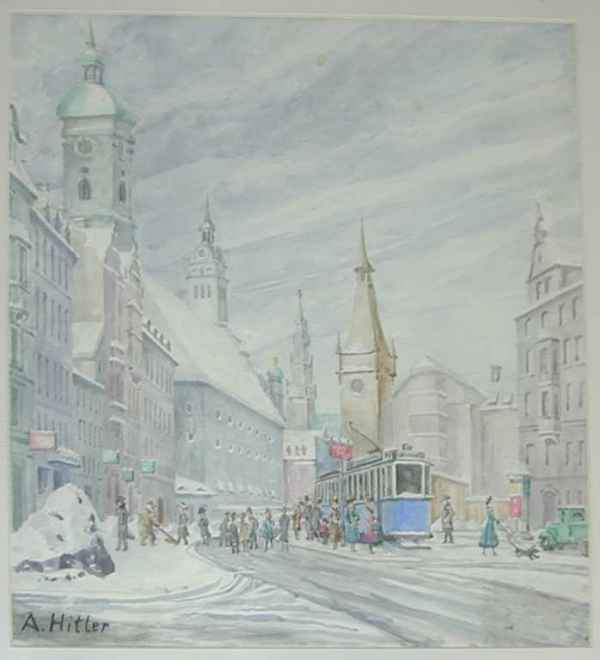
1914 Starving artist Adolf Hitler [example above], at the expense of the Consulate, presents himself to the Austrian authorities at Salzburg for his pre-enlistment medical examination. The brief medical exam results in this brief report: "Unfit for combatant and auxiliary duty, too weak. Unable to bear arms." Hitler, who is most certainly greatly relieved by this outcome, returns to his small room in Munich to continue his "studies." [For further details, Click here.]
1917 USA: Immigration act passed over Wilson's veto:
With more than a two-thirds majority, Congress overrides President Woodrow Wilson's veto of the previous week and passes the Immigration Act. The law required a literacy test for immigrants and barred Asiatic laborers, except for those from countries with special treaties or agreements with the United States, such as the Philippines.
During the late 19th and early 20th centuries, the United States received a majority of the world's immigrants, with 1.3 million immigrants passing through New York's Ellis Island in 1907 alone. Various restrictions had been applied against immigrants since the 1890s, but most of those seeking entrance into the United States were accepted.
However, in 1894, the Immigration Restriction League was founded in Boston and subsequently petitioned the U.S. government to legislate that immigrants be required to demonstrate literacy in some language before being accepted. The organization hoped to quell the recent surge of lower-class immigrants from Southern and Eastern Europe. Congress passed a literacy bill in 1897, but President Grover Cleveland vetoed it. In early 1917, with America's entrance into World War I three months away, xenophobia was at a new high, and a bill restricting immigration was passed over President Wilson's veto.
Subsequent immigration to the United States sharply declined, and, in 1924 a law was passed requiring immigrant inspection in countries of origin, leading to the closure of Ellis Island and other major immigrant processing centers. Between 1892 and 1924, some 16 million people successfully immigrated to the United States to seek a better life. (History.com)
1918 War at Sea: U.S. steamship Tuscania is torpedoed and sinks:
On February 5, 1918, the Anchor line steamship Tuscania, traveling as part of a British convoy and transporting over 2,000 American soldiers bound for Europe, is torpedoed and sinks off the coast of Ireland by the German submarine U-77.
For the first three years of the war, the British Admiralty had resisted calls for a convoy system to protect merchant ships coming to Britain from the United States, Canada and other countries, on the grounds that such a system would divert ships and sailors from the defense of Britain's own coastline or confrontation of the German enemy at sea. A stream of successful attacks by German submarines, however, finally forced the British to set up a system under which all merchant ships sailing across the Atlantic would travel in groups and would be given heavy protection by the British navy. A typical convoy could consist of 10 to 50 merchant ships, possibly including a troopship, escorted by a cruiser, six destroyers, 11 armed trawlers and two torpedo boats, each equipped with an aerial balloon from which submarines and torpedo tracks could be observed from above.
The convoy system, introduced on May 24, 1917, became especially important after the U.S. entry into the war in April 1917, when large numbers of American soldiers headed across the Atlantic. Convoy gathering points were soon established along the North American coastline. The Tuscania, captained by Peter McLean, embarked on its final journey from Hoboken, New Jersey, on January 23, 1918, carrying 2,397 American servicemen bound for the front in Europe toward Le Havre, France, as part of the British convoy HX-20.
The German submarine U-77, with its crew of 34 men under the command of Lieutenant Commander Wilhelm Meyer, spotted the Tuscania and its convoy on the evening of February 5, just eight miles off the Irish coast. After moving into position, Meyer fired two torpedoes at the Tuscania. The first torpedo missed, but the second torpedo scored a direct hit on the starboard side, causing a terrific explosion. The 14,384-ton steamer immediately took a great list and crewmembers were plunged into darkness as they began lowering lifeboats into the sea. Of the 2,397 American servicemen on the Tuscania, the convoy was able to rescue 2,187, along with the majority of the ship's British crew.
On the whole, the British convoy system was highly successful. In the last two years of the Great War, it drastically reduced the number of ships, men and supplies lost to the Germans at sea. Above all, it played a crucial role in protecting U.S. troops crossing the Atlantic to aid the Allies: of the 1.1 million American troops transported in convoy to Europe between May 1917 and November 1918, only 637 were drowned as a result of U-boat attacks. (History.com)
1923 Weimar: A general mine strike against wage cuts occurs in the Saar:
France failed to maintain her superiority over Germany, which she enjoyed at the end of the war. The character of the peace the French fought for at Versailles was a contributing factor, but that treaty was not alone at fault. The persistent controversy between the political Left and Right had a significant effect on French policy towards Germany. The issue boiled down to whether France should try to use force or persuasion with the Germans; to go it alone or in conjunction with Britain. The rightwing parties believed that Germany understood only force and should not be given any freedom of choice. The Right was willing to cooperate with concerted international actions, but only if it would help France to enforce the Treaty of Versailles unchanged. However, they were not willing to wait for the League of Nations to take action.
1937 USA: Roosevelt announces "court-packing" plan:
President Franklin Roosevelt announces a controversial plan to expand the Supreme Court to as many as 15 judges, allegedly to make it more efficient. Critics immediately charged that Roosevelt was trying to "pack" the court and thus neutralize Supreme Court justices hostile to his New Deal.
During the previous two years, the high court had struck down several key pieces of New Deal legislation on the grounds that the laws delegated an unconstitutional amount of authority to the executive branch and the federal government. Flushed with his landslide reelection in 1936, President Roosevelt issued a proposal in February 1937 to provide retirement at full pay for all members of the court over 70. If a justice refused to retire, an "assistant" with full voting rights was to be appointed, thus ensuring Roosevelt a liberal majority. Most Republicans and many Democrats in Congress opposed the so-called "court-packing" plan.
In April, however, before the bill came to a vote in Congress, two Supreme Court justices came over to the liberal side and by a narrow majority upheld as constitutional the National Labor Relations Act and the Social Security Act. The majority opinion acknowledged that the national economy had grown to such a degree that federal regulation and control was now warranted. Roosevelt's reorganization plan was thus unnecessary, and in July the Senate struck it down by a vote of 70 to 22. Soon after, Roosevelt had the opportunity to nominate his first Supreme Court justice, and by 1942 all but two of the justices were his appointees. (History.com)
1939 Various:
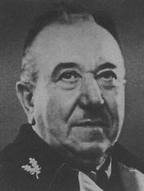
Volkishness: Weisthor (Wiligut) is reported by Karl Wolff‑‑Chief Adjutant of Himmler's person staff‑‑as having retired on his own application for reasons of age and poor health. Wolff informs Weisthor's SS staff by letter that his SS office will be dissolved accordingly. (THP)
Otto Rahn unexpectedly resigns from the SS: (See February 5 and March 13) (THP)

Rumours abound concerning Otto Rahn's departure from the Nazi SS. Some claim that he was a homosexual or of Jewish descent, but evidence is lacking. In a conversation Rahn claimed that he had been betrayed and that his life was in danger. In a letter to a friend he openly expressed his concern about the Third Reich: "I have much sorrow in my country. Fourteen days ago I was in Munich. Two days later I preferred to go into my mountains. Impossible for a tolerant, liberal man like me to live in the nation that my native country has become.
1940 World War II: Scandinavia: The British and French Supreme War Council decides to intervene in Norway and to send help to Finland. The pretext of helping Finland is primarily intended to prevent Swedish iron ore from reaching Germany.
1941 World War II: Various:
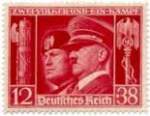
Hitler to Mussolini: Fight harder!:
On this day in 1941, Adolf Hitler scolds his Axis partner, Benito Mussolini, for his troops' retreat in the face of British advances in Libya, demanding that the Duce command his forces to resist.
Since 1912, Italy had occupied Libya because of purely economic "expansion" motives. In 1935, Mussolini began sending tens of thousands of Italians to Libya, mostly farmers and other rural workers, in part to relieve overpopulation concerns in Italy. So by the time of the outbreak of the Second World War, Italy had enjoyed a long-term presence in North Africa, and Mussolini began dreaming of expanding that presence—always with an eye toward the same territories that the old "Roman Empire" had counted among its conquests.
Also sitting in North Africa were British troops, which, under a 1936 treaty, were garrisoned in Egypt to protect the Suez Canal and Royal Navy bases at Alexandria and Port Said. Hitler had offered to aid Mussolini early on in his North African expansion, to send German troops to help fend off a British counterattack. But Mussolini had been rebuffed when he had offered Italian assistance during the Battle of Britain. He now insisted that as a matter of national pride, Italy would have to create a Mediterranean sphere of influence on its own—or risk becoming a "junior" partner of Germany's.
But despite expansion into parts of East Africa and Egypt, Mussolini's forces proved no match for the Brits in the long run. British troops pushed the Italians westward, inflicting extraordinary losses on the Axis forces in an attack at Beda Fomm. As Britain threatened to push the Italians out of Libya altogether and break through to Tunisia, Mussolini swallowed his pride and asked Hitler for assistance. Hitler reluctantly agreed (it would mean the first direct German-British encounter in the Mediterranean)—but only if Mussolini stopped the Italians' retreat and kept the British out of Tripoli, the Libyan capital. But the Italians continued to be overwhelmed; in three months, 20,000 men were wounded or killed and 130,000 were taken prisoner. Only with the arrival of German Gen. Erwin Rommel would the Italian resistance be strengthened against further British advances. Even with Germany's help, Italy was able to defend its North African territory only until early 1943. (History.com)
[See: How Did the Pact of Steel Effect Germany and Italy?]
East Africa: British and Free French forces begin theBattle of Keren to capture the strategic town of Keren in Italian Eritrea. [For further information, click here.]
1943 World War II: Various:
Resistance: Netherlands: Amsterdam opposition group CS-6 shoots down Waffen SS Lieutenant-General, NSB-'minister' Seyffardt.
In 1943 Dutch resistance fighters committed a series of attacks on several collaborators, killing a number of leading Dutch 'national-socialists'. General Seyffardt, the commander of the Dutch Volunteer Legion, was among the victims and the German occupiers as well as the Dutch collaborating movement had no choice but to react. Rauter and the Germanic SS in the Netherlands, led by Henk Feldmeijer, all shouted for revenge. They got it
Resistance: Germany: Clandestine Radio Atlantiksender, Germany, makes its first transmission.
FDR to Stalin:
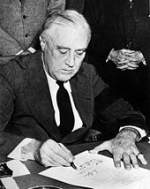
As Commander-in-Chief of the Armed Forces of the United States of America I congratulate you on the brilliant victory at Stalingrad of the armies under your Supreme Command. The one hundred and sixty-two days of epic battle for the city which has forever honored your name and the decisive result which all Americans are celebrating today will remain one of the proudest chapters of this war of the peoples united against Nazism and its emulators.
1945 World War II: Various:
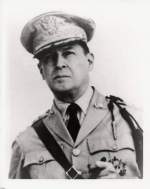
Pacific: US troops under General Douglas MacArthur enter Manila, Philippines.
Death: Denise Bloch, Lilian Rolfe and Violette Szabo:
On or about this date in 1945, three women who had been caught behind German lines working for the British Special Operations Executive were shot at Ravensbruck. Denise Bloch, Lilian Rolfe, and Violette Szabo were all fluent young Francophones who volunteered their services for Britain's dangerous spying-and-sabotage operations in support of the French Resistance. Bloch and Rolfe were wireless operators; Szabo, the most famous of the three, got her hands dirtier with explosives and sabotage.
One evening towards 1900 hours they were called out [of the punishment block] and taken to the courtyard by the crematorium. Camp Commandant Suhren [German Wikipedia link] made these arrangements. He read out the order for their shooting in the presence of the chief camp doctor, Dr. Trommer, SS Sergeant Zappe, SS Lance Corporal Schult, SS Corporal Schenk, and the dentist Dr. Hellinger . . . .
All three were very brave, and I was deeply moved. Suhren was also impressed by the bearing of these women. He was annoyed that the Gestapo did not themselves carry out these shootings.
Prisoners: The Swedish foreign minister, Christian Guenther, gives permission for Count Folke Bernadotte, second in command of the Swedish Red Cross, 'to attempt to obtain permission in Germany for the transport to Sweden or Denmark of the interned Norwegian and Danish prisoners.' (Waller) From Dulles by Leonard Mosley:Throughout the war the Swiss government had followed an even-handed policy toward the activities of the Germans and the Allies inside its country, except that, to adapt George Orwell, it had sometimes been more even-handed toward the one rather than the other, according to the way the tide of the war was flowing. It was definitely the Allies' turn to be favored in the spring of 1945, and not simply because they were now certain to win. How soon they won, and what the Germans did before they lost, was the urgent concern of the Swiss now. They were particularly anxious that the battle in northern Italy should be brought to a conclusion as speedily as possible, before the port of Genoa, through which land-locked Switzerland received most of her supplies, was completely wrecked. And they dreaded a long-drawn-out slogging match between the two armies which would, inevitably, end with a German retreat, for that would mean the escaping troops would try to take refuge in Switzerland, where they already had all the refugees they could handle. [See: The Last Days of the Third Reich.]
1946 Nuremberg Tribunal: Fifty-first Day: Deputy Chief Prosecutor for the French Republic, M. Edgar Faure, delivers his Presentation on Propaganda.
M. Edgar Faure:The evidence that I intend to present to the Tribunal with regard to the occupied countries of the West bears upon this aspect of the systematizing of German criminal enterprises. We have said that Germanization did not consist in the particular fact of the imposition of German nationality or of German law, but in the general imposition of the standards established by the Nazi regime, and in a general way, of its philosophy. This aspect of Germanization implies criminal activity at once as a means and as an end- as a means, because the criminal means is very often highly effective, and we know that Nazism professes indifference in regard to the immorality of the means; as an end, on the other hand, since the final organization of Nazi society postulates the elimination of elements hostile to it or which it regards as undesirable. Under these conditions the criminal activities therefore do not appear as accidents or regrettable incidents of war and of occupation. They must not be ascribed to un-coordinated action on the part of subordinates due to overzealousness or lack of discipline.
As the elimination of adversaries is recommended in principle, it will be carried out in fact by the normal and regular functioning of the administrative apparatus. If Nazism has a philosophy of criminal action, it also has, properly speaking, a bureaucracy of criminal activity. [For the full text of today's proceedings, Click here.]
1948 Death: Johannes Blaskowitz: Wehrmacht General who planned the Polish campaign, led the Eighth Army in Poland, and subsequently became the CIC of the Army Of Occupation. A professional soldier of the old school, his [ascendance] in the Third Reich was rapid. In 1935 he was promoted to Lieutenant-General and assumed command of Defense District Three, Stettin. In 1938 he was the field commander of Army Group Three in Dresden, which he led into Austria and Bohemia, and then the Sudetenland in 1939. After surviving a severe flank attack at Pozen, which only the assistance of Reichenau's Tenth Army was able to stem, he received the surrender of Warsaw on September 27, and was made military governor of Poland on October 22. It was at this time that Blaskowitz received his first lesson in Nazi criminality. He wrote two blistering memos to his immediate superior, Field Marshal von Brauchitsch, concerning the activities of the Einsatzkommandos and detailing such crimes as beatings, rapes, looting, and of course, murder. An enraged Hitler, complaining of Blaskowitz's 'childish attitude,' relieved him of his commands, but continued to make use of his superior military talents throughout the war. Surrendering to the British while engaged in the Netherlands, he committed suicide in Nuremberg prison shortly before his trial as a minor war criminal. Though it has never been proven, his fellow prisoners forever remained convinced that he was actually murdered by an SS death squad.
1958 Various:
USA: A Mark 15 nuclear bomb disappears off the shores of Tybee Island, Georgia, after it is jettisoned during a practice exercise when the bomber carrying it collides in midair with a fighter plane. [For further information, click here]
Middle East: Gamel Abdel Nasser is nominated to become the first president of the new United Arab Republic, a short-lived union of Syria and Egypt. (AP)
1985 Peace: The mayors of Rome and Carthage signed a peace treaty to ceremonially end the Third Punic War, 2,131 years after the conflict had ended. [For further information, click here]
1989 The last Soviet troops leave Kabul:
In an important move signaling the close of the nearly decade-long Soviet military intervention in Afghanistan, the last Russian troops withdraw from the capital city of Kabul. Less than two weeks later, all Soviet troops departed Afghanistan entirely, ending what many observers referred to as Russia's "Vietnam." [For further information, click here]

1983 Klaus Barbie—wanted Nazi war criminal—is imprisoned in Lyons, France, following extradition from Bolivia.
Edited by Levi Bookin (Copy editor)
levi.bookin@gmail.com



Click to join 3rdReichStudies

FAIR USE NOTICE: This site may contain copyrighted material the use of which has not always been specifically authorized by the copyright owner. We are making such material available in our efforts to advance understanding of historical, political, human rights, economic, democracy, scientific, environmental, and social justice issues, etc. We believe this constitutes a 'fair use' of any such copyrighted material as provided for in section 107 of the US Copyright Law. In accordance with Title 17 U.S.C. Section 107, the material on this site is distributed without profit to those who have expressed a prior interest in receiving the included information for research and educational purposes. If you wish to use copyrighted material from this site for purposes of your own that go beyond 'fair use', you must obtain permission from the copyright owner.
Please note that the list-owner and the moderators are not responsible for, and do not necessarily approve of, the random ads placed on our pages by our web server. They are, unfortunately, the price one pays for a 'free' website.